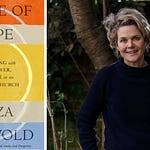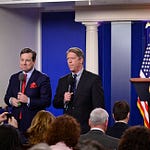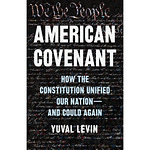I wrote about Jonathan Rauch's book a month ago. It's called Cross Purposes: Christianity's Broken Bargain With Democracy. Here's a portion of the transcript of our interview.
Jon Ward: I wanted to start by asking you a question about a line that comes over a hundred pages into the book. It's a subheading in one of your chapters and it says Tear down this wall, which of course is a play on President Ronald Reagan's line about the Berlin Wall.What wall are you talking about?
Jonathan Rauch: You said something that was a breakthrough for me in my own thinking. You said that the evangelical church does a pretty good of inculcating virtue among in people's personal lives, their families, their communities, their churches. When Hurricane Helene comes in Asheville, the churches are there. But they have not done a good job of inculcating virtue in public character: how Christians address the civic realm, especially politics and social media, where Evangelicals have behaved very differently.
Christianity is a seamless garment. It's not to be compartmentalized to only one sphere of life. Yet the church has had almost nothing to say about how to approach the civic realm, how to talk, to behave with your fellow citizens. And the result of that has been a wall of separation between private Christianity and civic Christianity. There's no civic theology: how does Christ want Christians to behave in the civic realm? That emptiness has left a great hollow sucking void into which Christians have poured a lot of fear-based and often sharply partisan political divisive behavior. And so I'm saying tear down this wall. Extend Christ's teachings to all of the life, not just the personal parts.
Jon Ward: I think tear down this wall is another part of your book: you're saying this to secular people, people who believe in a very strict separation of church and state to the point where they don't want religion being talked about in public life very much. They don't want religious values of a certain sort being brought into the public square. I feel like your book is also saying to them, 'Tear down that wall.'
Jonathan Rauch: It's saying a bit of that. I am a believer in church-state separation. I do not believe in Christian nationalism, for example. The First Amendment is first for a reason and that says that government has no business meddling in the affairs of religion.
I'm a secular liberal and I think people like me took Christianity either for granted or became actively hostile to it in the modern era. Now we had reasons to become hostile to it. I'm gay and one of the reasons the first 25 years of my life were painful and distorted and soul crushing was the teachings of the church: that people like me were a stench in God's nostrils, that we were bringing damnation on the whole country, and all the hate that went with that. So I grew up believing that the Christian Church was bigoted, cruel and hypocritical, and I was by no means entirely wrong in that assessment.
That said, the broken bargain of the subtitle of my book — Christianity's Broken Bargain with Democracy — is that along with the most robust guarantee of religious freedom ever conceived by human minds, which the founders bestowed upon the church, they also gave it an assignment implicitly. They said, 'Look, the Constitution, we can give you the forms of government, a constitution and institutions, but we cannot give you Americans the values that sustain those things like truthfulness and being rational, making sure you're educated on civic matters, civility, lawfulness. These are things that have to come from outside the system.' They warned us again and again that no constitution would protect us if we lack what they call Republican virtues, which are what we're talking about here.
Though they never said, and did not believe, that only Christians can be good Americans or that America is a Christian nation, they did understand that those values have to come from civil society, which means of course families and civic institutions. But very largely to them it meant Christianity. And they warned us that if we neglected the civic virtues and the institutions that create them, our democracy would not survive.
I think they were prophetic. We are seeing in the past 20 years the collapse of Christianity, especially white evangelicalism, which for a while looked like it was thriving. It's not anymore. And in the space that's being left by Christianity, we're seeing substitute pseudo religions that include things like wokeness and MAGA and Qanon. Many of them are outright antisocial, and the ones that aren't — SoulCycle or Wicca or whatever — maybe they work for some individuals some of the time, but they can't transmit great value systems over generations and bring large numbers of people together around some theological underpinnings. And I think that's causing us a social disintegration that's making us ungovernable.
So I think the other wall of separation is secular liberals like me have got to start caring about the health of our faith sector, and especially evangelical Protestantism.
Jon Ward: I just wanted to quickly hit a point you mentioned on page 43, that the whole point of liberalism is to preserve this system that you wrote about in your last book, The Constitution of Knowledge: A Defense of Truth. And it seems like a lot of your writing and even your career at this point is trying to prevent a return to a pre-enlightenment world where blood is shed over disagreement over these issues that ultimately can't be proven one way or another. Do you have any thoughts on that?
Jonathan Rauch: Well that's exactly right. Since I started work on the book — Kindly Inquisitors: The New Attacks on Free Thought, that came out in 1993 — I've had a few portfolios. One is same-sex marriage. But the main one has been trying to understand and protect and advance liberal institutions and thinking. I mean small "l" liberal: the great tradition of the founders, founded on the idea that all humans are born free and equal. That's the liberal philosophy in a nutshell, which is — like Jesus's Christianity — a radical break with anything that came before and a hugely positive and powerful social technology. It gives us the markets that we rely on for prosperity, the science that we rely on for knowledge and the constitutions and Republican system that we rely on for politics. And it's been embattled from day one, and it will always be embattled, because for all kinds of reasons, lots of people find liberalism either insufficient or downright malevolent. And so this is a challenge that we can never stop. I think people like me made the mistake in the post-war period of thinking it was all over. We'd solve the problem. End of history and all that. Well, we were wrong, we were very wrong, and we were especially wrong about America right now.
Jon Ward: On page 135 you write a pretty noteworthy sentence. I marveled at this sentence. You write, 'I treasure feeling like an outsider.' Of course you are a gay atheist Jew. You could even subtitle this book, 'A gay atheist Jew walks into a mega church.'
Jonathan Rauch: I love it.
Jon Ward: Talk about why you treasure that feeling of being an outsider.
Jonathan Rauch: I will. But tell me what you found so remarkable about that.
Jon Ward: Oh, I just think it's still unusual. I mean, the overwhelming, I think human instinct is to want to be an insider to belong. And I think I've written a decent amount about this blessing and curse of being what I call a border stalker, somebody who goes between groups and is never fully inside one. But I feel like it's a gift. So that's why I think I just saw a fellow traveler in that statement. And I don't know if I want to say that I wish more people were like that because then maybe it wouldn't be as distinct. But I think if more people were comfortable with that feeling, I think the world would be a better place.
Jonathan Rauch: I end the book with Mark Labberton, who's a theologian, talking about the church as exilic. Too much of the church has adopted an insider mindset of, 'We run the country and it's ours to lose.' And that that's not at all a Christian mindset. Christianity is truest to itself and at its best when it's an exilic faith, when it's on the outside looking in, critiquing the things of this world to prepare us for the next world. And of course, Judaism is an exilic faith. And the church of Jesus Christ of Latter-Day Saints is an exilic faith. Their temple is not in the promised Land. It's in Salt Lake City. That's not where scripture says it ought to be.
So growing up, realizing I was different on all three of those dimensions. I didn't acknowledge I was gay until I was 25, and that was a very hard 25 years, which I wrote about in a mini book that you can get on Amazon super cheap. It's called Denial: My 25 Years Without a Soul. And as the subtitle implies, I thought I was some kind of monster, because I thought I was incapable of love, because I thought heterosexual love was the only kind that existed.
So coming up as an outsider in the sixties and seventies, being those things was really, really hard. I would not recommend it to anyone for a good time. And yet I think minorities and the marginalized are always the moral pioneers. They're always the people, they look at society from the edges. So they're always the first to see the transgressions and injustices. And I think it was that status that made me become the advocate that I have been for my whole life, of LGBT Equality and the liberal project generally, which as we said earlier, is so focused on the rights of minorities and on justice as seen from the point of view of the least of these.
So when I go and talk to college campuses about free speech, the title of my talk is "Why Free Speech is the Only Safe Space for Minorities." And I tell students, yes, it is true that being a minority being marginalized is a burden, but that doesn't mean you're a victim. It's also a privilege because you're at the vanguard of justice. And so don't complain about being a member of a marginalized community. Use that.
Jon Ward: I want to end on the topic of compromise. You say on page 98 that compromise is generative. We overwhelmingly think of compromise as something that subtracts and takes away, both from the outcome of whatever we're engaged in and from us as individuals. You are saying that in fact, compromise adds, it adds new elements, often unforeseen or not thought of to the outcome of the negotiation. It adds new relationships never before considered, often with those on different sides of an issue. And then those relationships spur new insights and thoughts and possibilities, and it adds qualities to us who are engaged in this adventure of working with the other. It makes us stronger, more fearless, more creative. We're multifaceted, more capable of many things we could not have done before, and it makes us more alive and more human. So I just wanted to thank you for making that point. I thought it was sort of a small point in the book, I guess, but one that really stood out for me.
Jonathan Rauch: Well, thank you, Jon. This has been a point on which I've been evangelical for years. An article I wrote maybe back in 2013, it's called "Rescuing Compromise." It's in National Affairs, Yuval Levin's Journal. And it spells all of this out. And why it is that James Madison's great political genius was to understand that the only way to make democracy safe was to harness ambition by pitting it against other ambition, and to harness faction, special interest, by having lots of different factions, and then forcing the ambitious and the factions to compromise in order to get anything done. And what he saw was that if you do that — if you structure it right — so that people who disagree and have very different views are forced to get into a room together and figure out a way forward to get what they want, that that's a generative process. It's a creative process.
It expands the sphere of the possible. It creates new options. It brings in new parties to the conversation. 'Well, the two of us can't figure this out. Who else can we add to the mix? Who can make this all work?' Madison understands that. And that's why if you had to summarize the Constitution in one very brief phrase, it would be that it is a compromise forcing mechanism. So it gives me heartache that compromise has become a four letter word in American politics.
Jon Ward: Well, it's scary and it requires courage and it's hard and it requires work. And so those who are scared and don't want to have to do that work sort of smear it as weak and a sellout.
Jonathan Rauch: Yep. It's the opposite. And to bring it back to the message of this book, that ethos that we're talking about — of looking for creative ways to live in peace with each other and solve our problems as a society — I think I can map that right back onto the teachings of Jesus.











